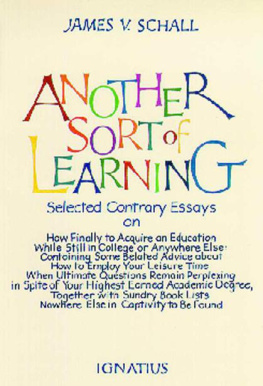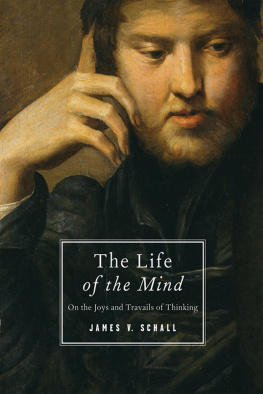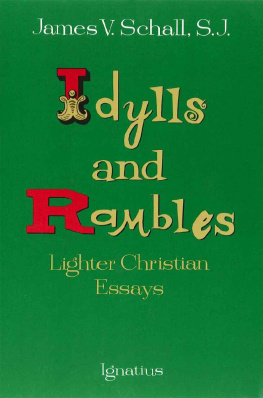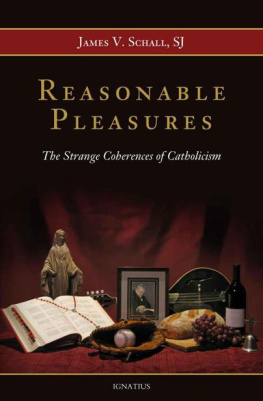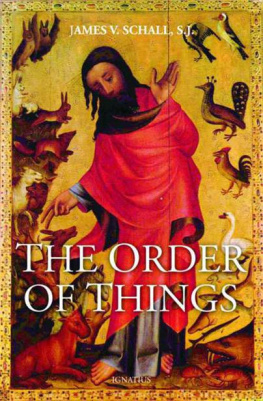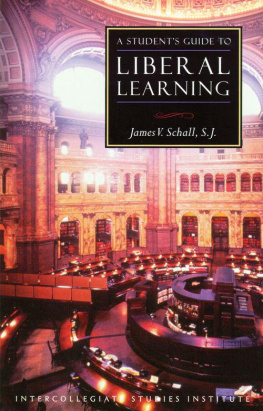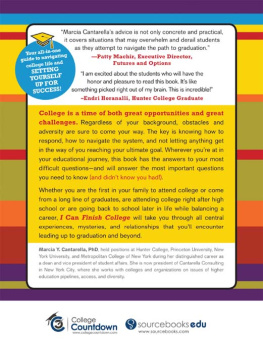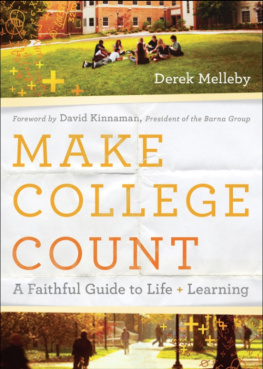Another Sort of Learning
JAMES V. SCHALL
Another Sort of Learning
Selected Contrary Essays on the Completion of Our Knowing or How Finally to Acquire an Education While Still in College, or Anywhere Else: Containing Some Belated Advice about How to Employ Your Leisure Time When Ultimate Questions Remain Perplexing in Spite of Your Highest Earned Academic Degree, Together with Sundry Book Lists Nowhere Else in captivity to Be Found
IGNATIUS PRESS SAN FRANCISCO
1988 Ignatius Press, San Francisco
All rights reserved
ISBN 978-89870-183-8
Library of Congress catalogue number 87-82977
Printed in the United States of America
Contents
Part 1
So Youre Still Perplexed Even in College?
Part II
Books You Will Never Be Assigned
Part III
Have You Thought about It This Way?
Preface
Several years ago, almost thirty now, I ran across the following passage in a book called Self-Made Mad , which, of course, is nothing less than the famous Mad Magazine . Let me cite it here:
Did you ever stop to wonder about how recent historical events will be reported in elementary school history books 100 years from now? We hate to think so, but in the year 2060, say, elementary school history books will probably be exactly the way they are now. Which means they will be simply written so that children who study them can find easy answers to everything, even things that college professors and historians wont fully understand. For instance, every historical figure will be either good or bad, with nobody a little good and a little bad, the way most people really are.
I have always loved this particular citation because it warns us that real education and formal education may not be at all the same things. There are, moreover, many things college professors and historians indeed do not understand. Do not be surprised at this. I am a college professor, and I know.
Eric Voegelin, in his wonderful book of Conversations , was not at all hesitant to remind us that it is rather common to go through our higher education without ever having been confronted with the questions that are basic to mankind wherever and whenever man has appeared on this earth. And what are these questions? Voegelin remarked:
The quest for the ground... is a constant in all civilizations.... The quest for the ground has been formulated in two principal questions of metaphysics. The first question is, Why is there something; why not nothing? and the second is, Why is that something as it is, and not different?
Such are questions behind which we cannot go, of course. That is to say, they constitute the ultimate questions concerning what is , about which we must ask. Yet, we are not regularly allowed to ask ourselves such questions. And often, as E. E. Schumacher, in a book I shall recommend again and again, remarked, even when we are allowed to ask such questions, we do not know how to pose them properly, freely. So there is room for some kind of guidebook, as it were, some help to find our way out of a system that is designed, consciously or unconsciously, to prevent us from confronting in our own lives the ultimate questions of existence and essence, the two questions that Voegelin posed as fundamental.
As the passage from Self-Made Mad implied, we are fallible beings, a combination of a little bad and a little good. Our age, in a strange way, is an age of perfectionism. We are no longer aware of the classical and Christian tradition that would free us from the Utopian premises by the reminder of the way most people really are. The classics were often nothing more than books on education: They sought to teach us how pass from esse to bene esse , from being to being well, to use Aristotles famous phrase for the task of politics. But politics, as Aristotle knew, led us to contemplation, to the consideration of the right order of things.
The premises of modernity, a phrase I take from Leo Strauss and Eric Voegelin, however, do not allow us to think there is such a thing as a right order in anything, particularly in ourselves. Philosophic pluralism or skepticism typical of modernity constantly reminds us that nothing is true, that it is in fact dangerous even to propose that there might be truth, for this would imply that some kind of decisions about reality can be made. And for many, this would jeopardize the foundations of the modern republic, which is said to be based, at best, on the pursuit of truth, never on the possibility of its being found.
The signs of human fallibility, it seems to me, are at least four. The first is the passing of time as fixed in our minds by recurring days that serve to define where we are in our past and our present, days like Thanksgiving and birthdays and New Years. Second, there is a certain humor that forbids us from claiming personal perfection. Then come our travels, which reveal to us how different the ways of other men are, yet how we are all precisely men, human beings, in all time and in all places. Finally, we have our broodings, which cause us to realize somewhere within ourselves how different we ourselves might be, how different perhaps we really ought to be, how stubborn in fact we actually are.
And so this is what we actually arebrooding creatures who while away the hours and the days reflecting and laughing. This will be a book then about time and learning, about humor and wonder. And we shall soon discover, I think, that such things are not so separate, nor even are they always different things. We can brood or chuckle in our voyages as in our readings. And the great feasts that mark our passingthe New Year, Ash Wednesday, Christmas, our birthdaysthese are at once delightful, prayerful, and poignant.
We are thus fallible creatures, and we should recognize it. And yet, and this is what I want to pursue in these various wonderments and ponderings of mine, we do search, we do seek. I believe that we are in a world today where most of this searching must take place outside the normal educational process and outside the myriads of media images and opinions with which we are constantly confronted.
Thus, this will be a kind of reflective effort to tell us what ought to attract us. Plato was eternally right when he realized that we are attracted in fact by the Good, however it might appear. We are constantly being drawn from outside of ourselves by what we had not accounted for. We are not already complete beings, but beings seeking completion. And Christianity was right to suspect that not only are we attracted by the Good, which brings us outside of ourselves, but that God also comes in search of us.
In his marvelous book the Intellectual Life , the French Dominican, A. G. Sertillanges, wrote:
Why hast thou come? St. Bernard asked himself about the cloister: Ad quid venisti ? And you, thinker, why have you come to this life outside the ordinary life, to this life of consecration, concentration, and therefore of solitude? Was it not because of a choice? Did you not prefer truth to the daily lie of a scattered life, or even to the noble but secondary preoccupations of action?
The scattered lifethis is either a description of a life that is founded on the premise of no theoretic order in the soul or the description of a life based on no disciplined virtue that would enable us to follow the important things, even if we should want to do so.
And so I have given this book a rather long and bemused secondary title: to wit, Selected Contrary Essays on the Completion of Our Knowing, or How to Acquire an Education While Still in College: Containing Some Belated Advice about How to Employ Your Leisure Time When Ultimate Questions Remain Perplexing in Spite of Your Highest Earned Degree, Together with Sundry Book Lists Nowhere Else in Captivity to Be Found. These essays will be precisely contrary because I believe it is possible to be open to and confronted by the highest things.. And I believe that this is what education, ultimately, is about. In this, I am a follower of Plato and Aristotle, of the two Testaments, of the Fathers and Doctors of the Church, of the tradition that singles out this civilization as one in which the highest things ought to be confronted by us.
Next page
